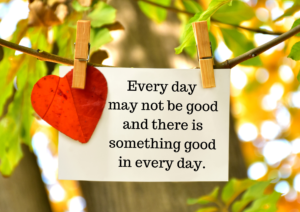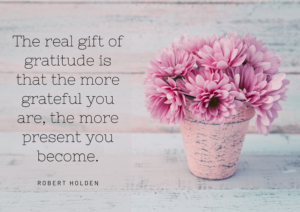The Art & Science of Gratitude
Gratitude is the art of being thankful. The word coming from the Latin word, gratus, which means pleasing or thankful. It is being able to show appreciation and return the kindness of others. Gratitude is about showing that you don’t take life, circumstances and people for granted.
Research by Dr Martin Seligman, known as the father of modern positive psychology, and many other renowned thinkers, show that the practice of gratitude increases people’s levels of wellbeing and happiness.
This practice helps people to feel more positive emotion, relish a satisfying experience, improves health, can help with dealing with adversity and build strong relationships. Gratitude can be shown for the world, a specific individual and yourself. It can be felt and expressed in multiple ways. For example, for the past, by retrieving positive memories, in the present by not taking good fortune for granted and in the future by maintain a hopeful and optimistic attitude.
The Benefits of Gratitude
A deliberate gratitude practice has been shown to light up the brains reward centre and flood the frontal cortex with neurotransmitters such as dopamine. This in turn has been shown to spark activity critical to sleep, orgasms, mood regulation and metabolism. Focusing on the positive can shift your heart rate, creating a feeling of stability and calm. Studies show that being grateful can increase social connections and create more satisfaction with family, friends, colleagues, your community and yourself.
Practicing gratitude can lesson anxiety and depression symptoms as it challenges negative thought patterns which calms the anxiousness and positivity boosts moods. Gratitudians also report and increase in empathy and compassion. The more thankful you are, the more likely you are to act pro-socially towards others causing others to feel grateful. It creates a ripple effect. Gratefulness can also increase resilience as it helps you to bounce back from stressful events. Productivity increases due to feeling more inspired and uplifted and it improves physical health by strengthening the immune system, lowering the blood pressure which, in turn, reduces symptoms of illness.
This is summarised in the table below
| Benefits of Practicing Gratitude
(according to multiple research studies) |
|
| Physical | Builds a stronger immune system
Less bothered by aches and pains Lower blood pressure Exercise more and take better care of health Sleep longer and feel more refreshed upon waking |
| Psychological | Higher levels of positive emotions
Feel more alert, alive and awake Experience more joy and pleasure Experience more optimism and happiness |
| Social | Tend to be more helpful, generous and compassionate
More forgiving More outgoing Feel less lonely and isolated |
Ways to Cultivate Gratitude
The key to cultivating gratitude is through a daily practice and not to rush it. You want to stop and feel it deeply. Ideas on a daily basis include:
- write a thanks-you note
- thank someone mentally
- keep a gratitude journal
- count your blessings
- pray and/or meditate
Gratitude on the hard days
At a simple level, gratitude shifts your focus from the negative to the positive. The mind is unable to focus on two thoughts simultaneously. The more you train your mind to focus on the positives, the more positives you have! But what about those days when it is hard? Believe or not, the best time to practice gratitude is on the days that you don’t feel like it. It is not always easy, however it can transform your mind and life. Podcasters, Marc & Angel Chernoff suggest that during the tough times in life, gratitude can broaden your focus rather than have tunnel vision of the hard stuff. They are clear that it is totally OK to feel the pain of the hard times (and essential to) and it is also important to remember the rest of your life. On those harder days Marc & Angel suggest to give these ideas a go:
- Make a list of all people, happenings, events, stuff that you are truly grateful for and display it in a place you will see it every day
- When someone upsets you, find one aspect about them you are grateful for
- When procrastinating on a task, be grateful for the opportunity to complete the task
- If you are sick or injured, find thankfulness in being alive and your bodies incredible ability to heal
- If someone doesn’t like you, be grateful they care enough to give you their attention.
The great thing about gratitude is even if you look for it and can’t find it, neuroscientists say it still has a very similar affect in the brain as if you did find things to be thankful for.
The Secret of Gratitude
The secret to gratitude is creating a deliberate and sincere practice. Every day, hour, moment, you have the opportunity to choose to be grateful, again and again and again. It is not always easy, and it is worth it. The effects might not be noticed immediately. Think of it like compounding interest at the bank for your savings account. It takes several weeks or months to start seeing the benefits.
Create visual reminders such a sticky notes or download an app (there are many to choose from) to give you a daily prompt. I have a private Facebook group where people post three things a day they are grateful for. You are welcome to join at: www.facebook.com/groups/2130234256994390 It is an amazing community!
Of course, you don’t have to believe the research. If you at not sure, try it. It costs nothing and you just might be pleasantly surprised.

Tags: gratitude, Karen Boyes, Karen Tui Boyes
Published on Wednesday, December 30th, 2020, under Health & Wellbeing, Inspiration, Success

Karen,
Thanks for these inspiring words of and about gratitude as we move into the new year of 2021!
All the Best to You and Your Family!
Valerie
I’m happy to have become acquainted with you this year via zoom. I first saw you as a guest on the TEFOS Summit with Seth Perler and have followed a lot of your work ever since this past fall. I enjoyed the summit you hosted as well and did purchase several of your materials from it.
THANKS! Who you are does make a difference!!!!!!!!